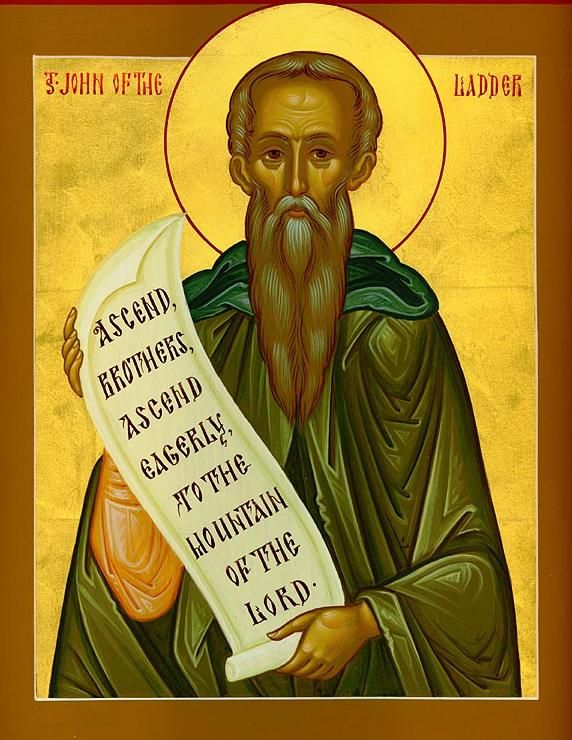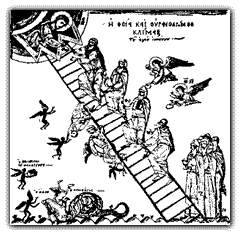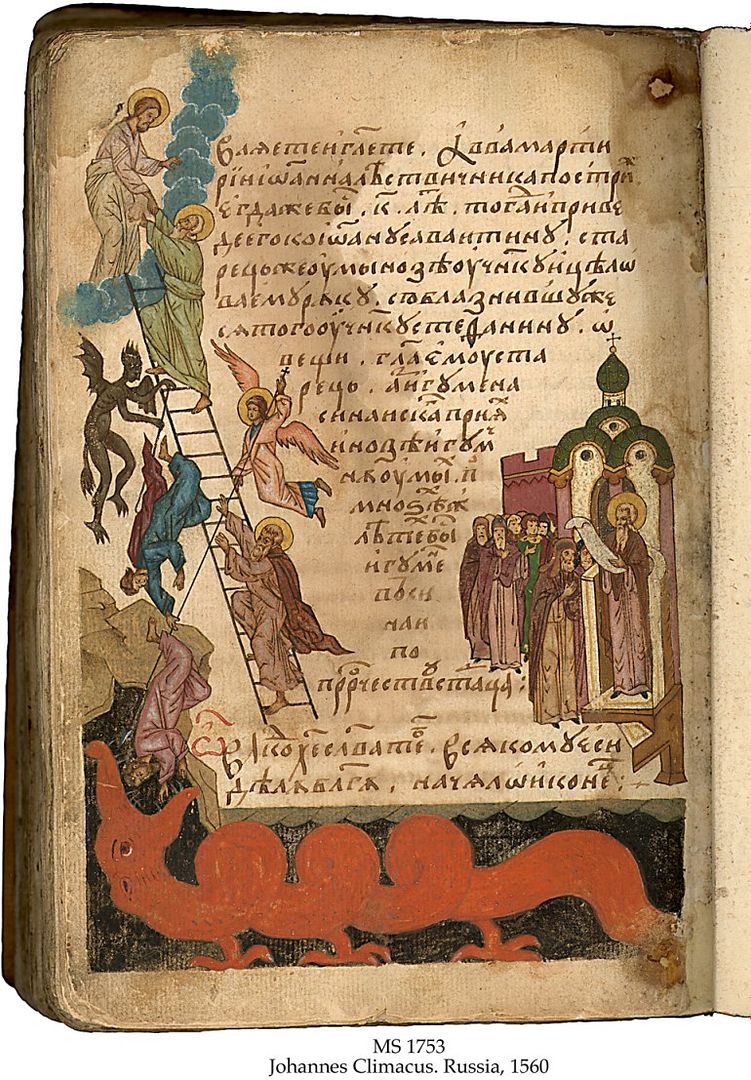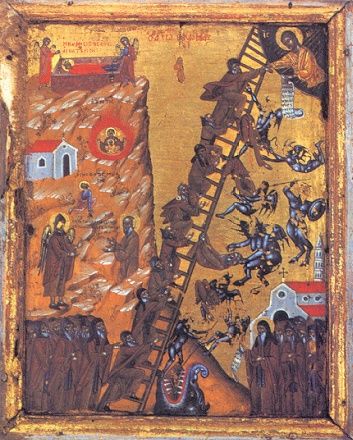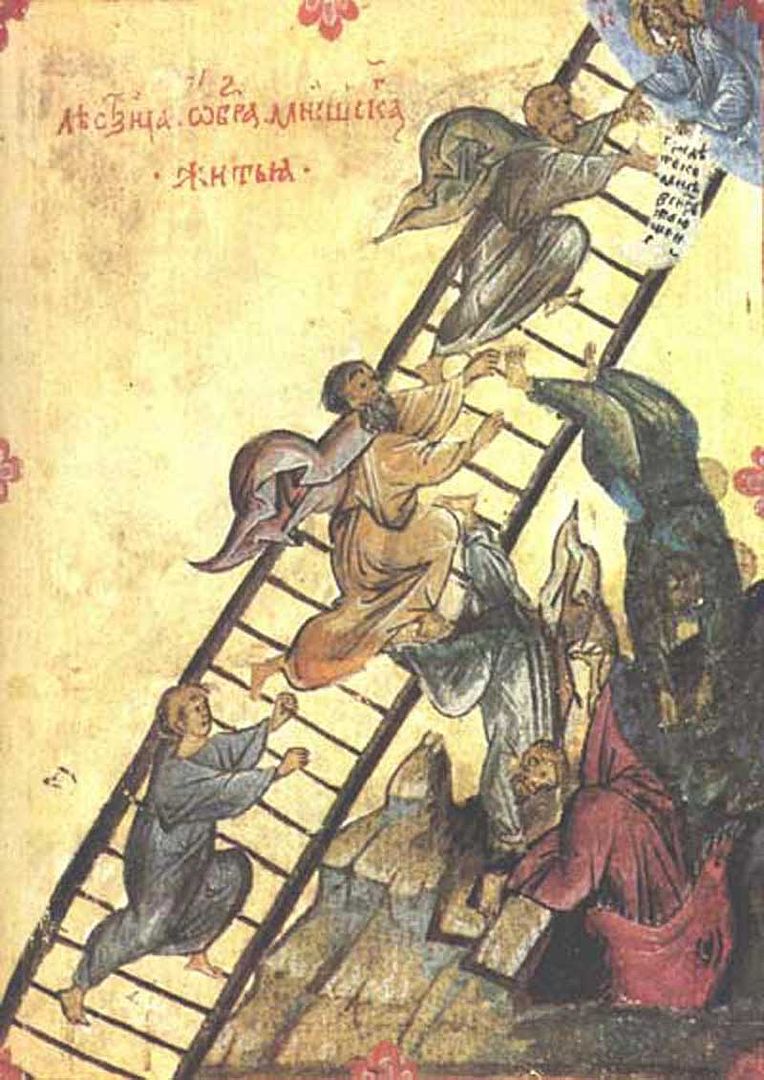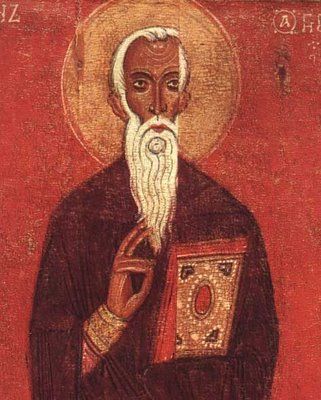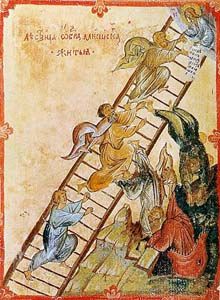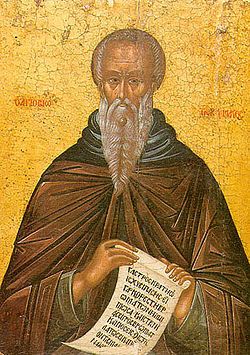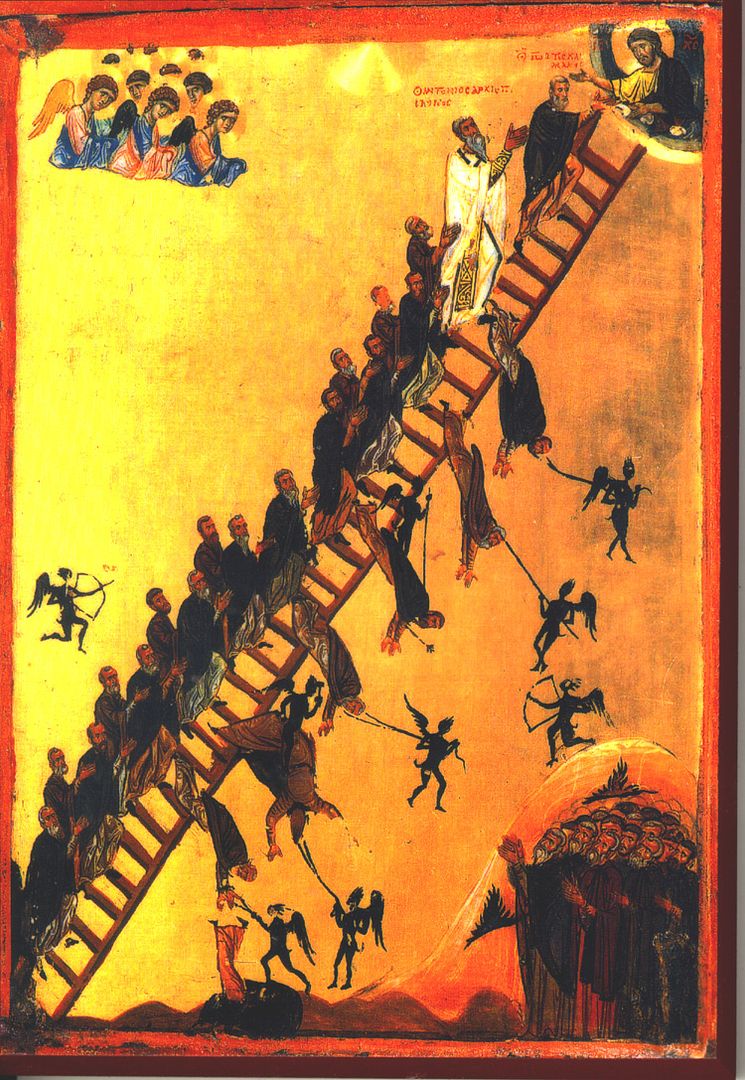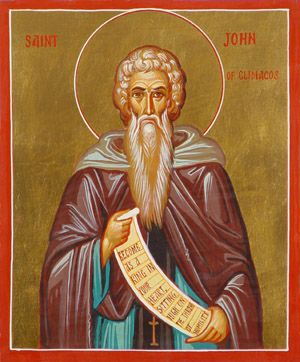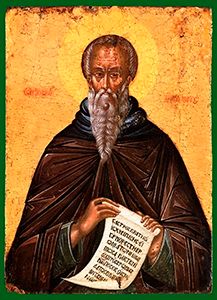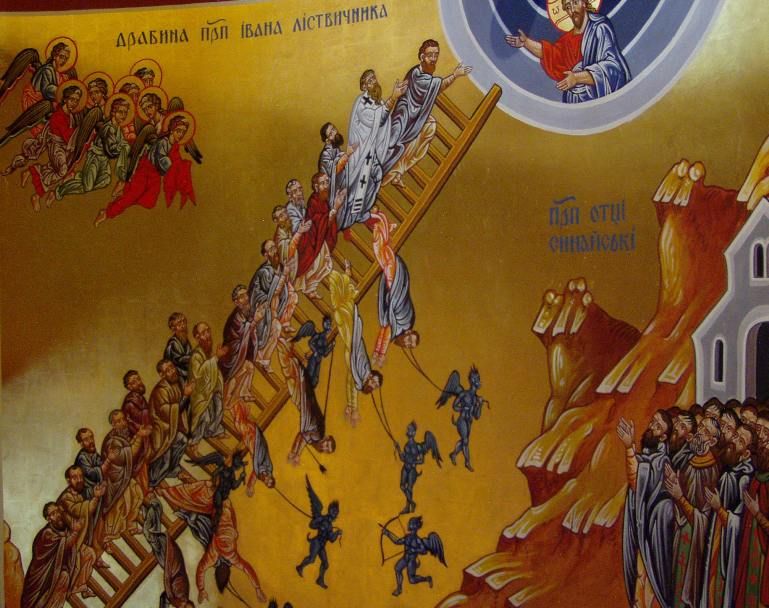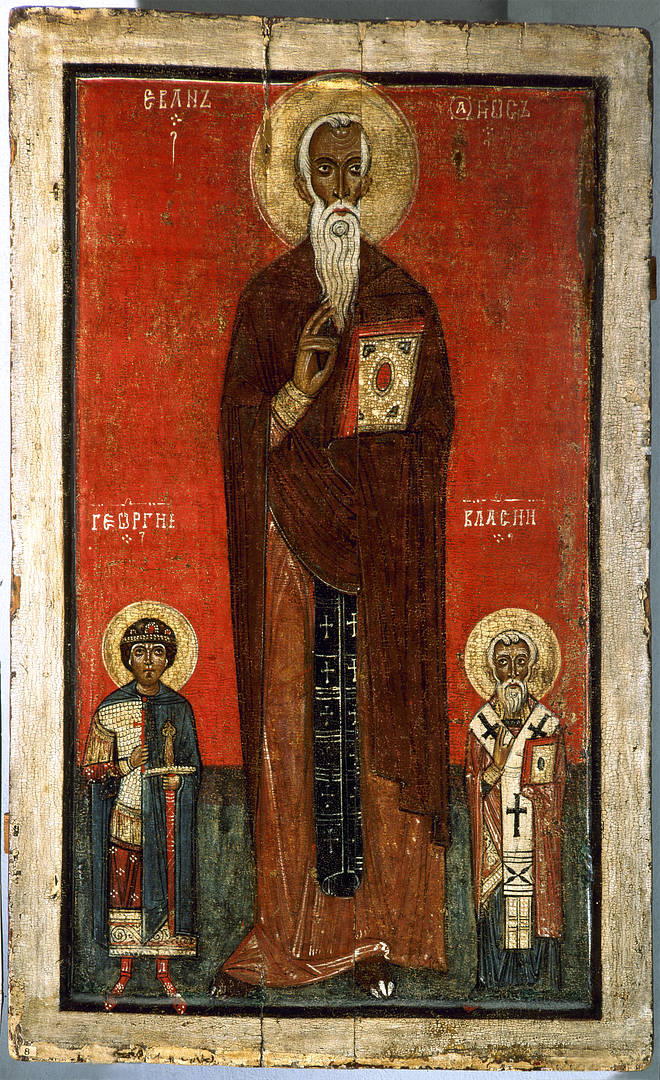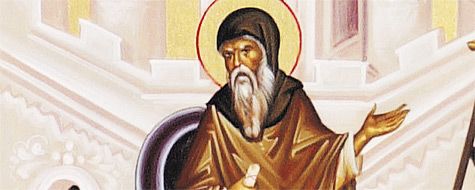“Do not be surprised that you fall every day; do not give up, but stand your ground courageously. And assuredly, the angel who guards you will honour your patience.”
Today, March 30, we celebrate the feast of
Saint John Climacus (also known as Saint John of the Ladder and John Scholasticus, 525-605), Abbot, and author of the “The Ladder of Paradise.” In this text, also translated as “The Climax of Paradise” (from which this holy man draws his referential name, Climacus), Saint John chronicles the 30 steps to Christian perfection—one for every year of Christ’s life until his baptism in the River Jordan by Saint John the Baptist.
Little is known about the early life of John. As a young man, he became a disciple of Saint Gregory Nazianzen, who referred to him as the “Scholastic” due to his great aptitude for learning and holiness. Despite great academic promise, John “retired” from academics at the young age of 16, and sequestered himself at a monastery on Mount Sinai, where he placed himself under the direction of a holy monk named Martyrius. On travels with the monk, John was predicted by various holy figures to be the future Abbot of Mount Sinai, a prediction which eventually came true.

As a novice, John was more fervent than any other, concentrating his efforts on self-mastery and the pursuit of Christian perfection. Upon the death of Martyrius, his mentor and director, John withdrew into a deeper solitude, studying the lives and writings of the saints, and spending his days in deep contemplation of the Lord. In this manner, he remained from the ages of 35 to 75, occasionally making trips into the Egyptian desert for instruction and inspiration. His holiness and wisdom became well known, and many visited seeking advice, counsel, and consolation in times of sorrow.
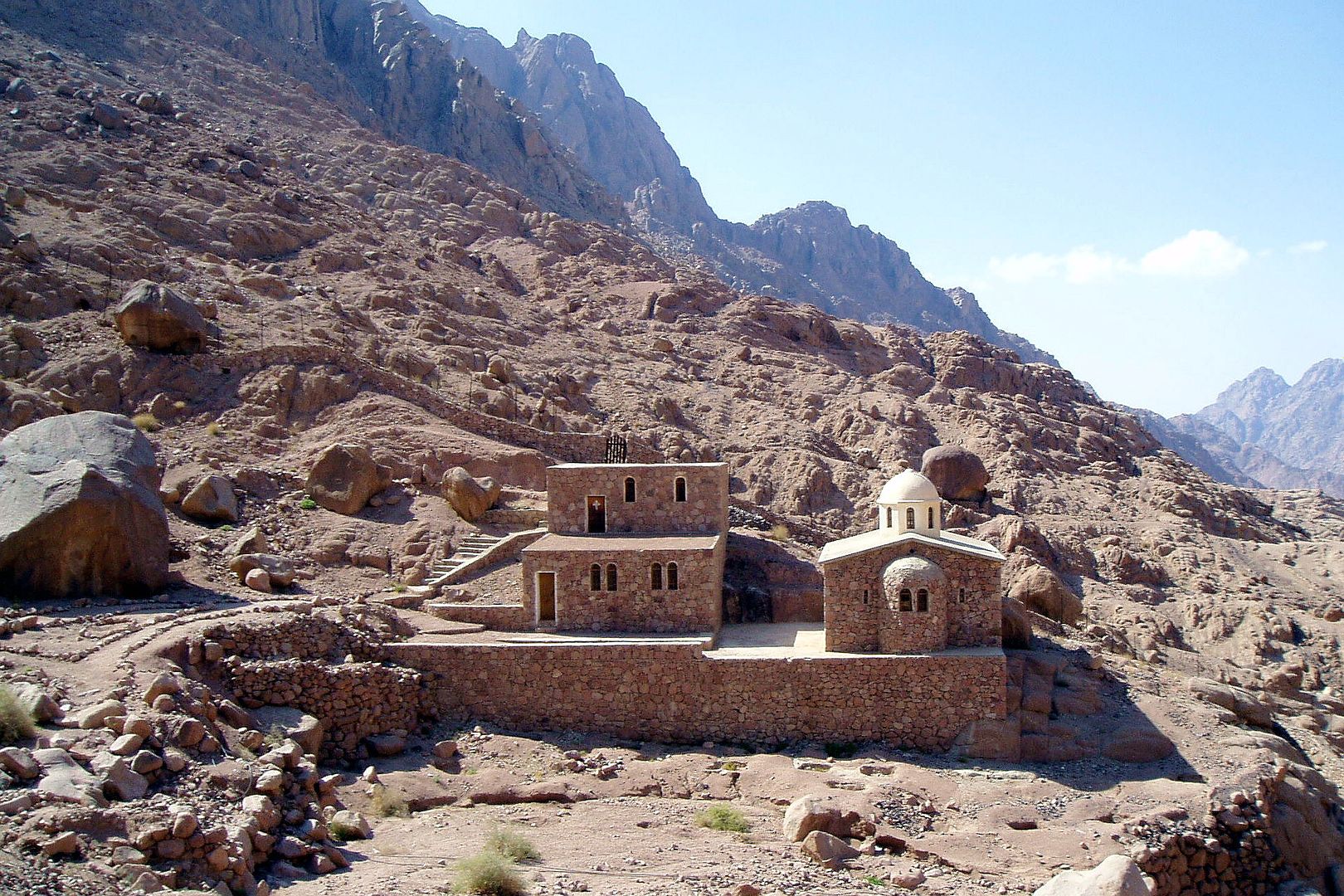 |
| Chapel of Saint John Climacus, Mount Sinai |
At the age of 75 (in approximately the year 600), John was chosen as Abbot of Mount Sinai by unanimous decision. Despite his election, he continued to spend his days in contemplation, even missing the lavish election dinner prepared for him. His biographer, a monk at the monastery, wrote of him: “he dwelt on the mountain of God, and drew from the splendid treasure of his heart priceless riches of doctrine which he poured forth with wondrous abundance and benediction.” John embraced every form of austerity, sleeping and eating very little, instead spending his time in prayer. His prayers were said to immediately cure both visible and invisible wounds, leaving those who prayed with him whole and refreshed in spirit.
Prior to his death, John was encouraged to write a list of rules which had guided his life. This he had already begun, in the form of the book, “The Ladder of Perfection.” In this book, he details the thirty degrees of advancement in the pursuit of Christian perfection. The 30 steps include:
1. On renunciation of the world
2. On detachment
3. On exile or pilgrimage; concerning dreams that beginners have
4. On blessed and ever-memorable obedience (in addition to episodes involving many individuals)
5. On painstaking and true repentance which constitutes the life of the holy convicts; and about the Prison
6. On remembrance of death
7. On joy-making mourning
8. On freedom from anger and on meekness
9. On remembrance of wrongs
10. On slander or calumny
11. On talkativeness and silence
12. On lying
13. On despondency
14. On that clamorous mistress, the stomach
15. On incorruptible purity and chastity, to which the corruptible attain by toil and sweat
16. On love of money, or avarice
17. On non-possessiveness (that hastens one Heavenwards)
18. On insensibility, that is, deadening of the soul and the death of the mind before the death of the body
19. On sleep, prayer, and psalmody with the brotherhood
20. On bodily vigil and how to use it to attain spiritual vigil, and how to practice it
21. On unmanly and puerile cowardice
22. On the many forms of vainglory
23. On mad pride and (in the same Step) on unclean blasphemous thoughts; concerning unmentionable blasphemous thoughts
24. On meekness, simplicity, and guilelessness which come not from nature but from conscious effort, and about guile
25. On the destroyer of the passions, most sublime humility, which is rooted in spiritual perception
26. On discernment of thoughts, passions and virtues; on expert discernment; brief summary of all aforementioned
27. On holy stillness of body and soul; different aspects of stillness and how to distinguish them
28. On holy and blessed prayer, the mother of virtues, and on the attitude of mind and body in prayer
29. Concerning Heaven on earth, or Godlike dispassion and perfection, and the resurrection of the soul before the general resurrection
30. Concerning the linking together of the supreme trinity among the virtues; a brief exhortation summarizing all that has said at length in this book
Saint John foretold the hour of his death, and went to it peacefully. He died in the monastery at Mount Sinai. His life and writings remain to inspire us as we continue our Lenten journey toward our own self-mastery.
Selected Quotations of Saint John Climacus:
“Fire and water do not mix, neither can you mix judgment of others with the desire to repent. If a man commits a sin before you at the very moment of his death, pass no judgment, because the judgment of God is hidden from men. It has happened that men have sinned greatly in the open but have done greater deeds in secret, so that those who would disparage them have been fooled, with smoke instead of sunlight in their eyes.”
"Nothing equals or excels God's mercies. Therefore, he who despairs is committing suicide. A sign of true repentance is the acknowledgment that we deserve all the afflictions, visible and invisible, that come upon us, and ever greater ones. Moses, after seeing God in the bush, returned again to Egypt, that is, to darkness and to the brick-making of Pharaoh, who was symbolical of the spiritual Pharaoh. But he went back again to the bush, and not only to the bush, but also up the mountain. Whoever has known divine vision will never despair of himself. Job became a beggar, but he became twice as rich again."


Requested Intentions: Freedom from imprisonment (J); Employment and end to depression (H); Successful employment (A); Health for a soon to be delivered baby (T); Financial security (L); Healing of tooth pain (A); Health of expectant mother and child (R); Purification of the souls in Purgatory (A); Guidance in studies (J); Healing and security for a displaced family (C); Healing of high blood pressure; Recovery of brother following surgery (A); For a sister in trouble, that she may make better decisions in the light of Christ (M); Health of expectant mother and child (R); Attainment of funds for surgery (J); Freedom from financial difficulties (E); For employment and college acceptance (E); Recovery and healing of a friend (C); For successful outcome to surgery (C); Healing for brother (M); Successful employment (C); For the victims of the Japanese tsunami/earthquake (J); Healing (E); For a son struggling with depression (B); Successful conception (M); Freedom from social anxiety; confidence in the Lord (J); Improved success in employment and studies (D); Freedom from illness (T); For a wife’s employment (E); Healing of a husband’s knee (M); Freedom from sickness (R); Healing (C); Restoration of marriage (F); Freedom from medical difficulties, employment, successful relationship (D); Healing of a father following stroke (S).
 For the next 40 years (first under Isdegerd, and then his son, Varanes), a general persecution was unleashed on Christians. Churches were destroyed, and Christians were tortured and imprisoned mercilessly. Among the faithful who suffered during this persecution was Saint Benjamin, a deacon. He was imprisoned for one year after being overheard preaching by a member of the royal court. Saint Benjamin was renowned for his zealous preaching, brining many Persians and Greeks to the faith. Following his imprisonment, an ambassador of the Emperor of Constantinople negotiated his condition release: the condition, that he never preached within earshot of any member of the royal court again.
For the next 40 years (first under Isdegerd, and then his son, Varanes), a general persecution was unleashed on Christians. Churches were destroyed, and Christians were tortured and imprisoned mercilessly. Among the faithful who suffered during this persecution was Saint Benjamin, a deacon. He was imprisoned for one year after being overheard preaching by a member of the royal court. Saint Benjamin was renowned for his zealous preaching, brining many Persians and Greeks to the faith. Following his imprisonment, an ambassador of the Emperor of Constantinople negotiated his condition release: the condition, that he never preached within earshot of any member of the royal court again.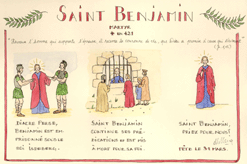 Saint Benjamin, however, at great risk to his life, declared it his duty to preach the Gospel of Jesus Christ, and could not remain silent. He resumed his preaching with great intensity, finding audiences wherever he could, including public places and street corners. Before long, he was re-arrested and brought before the king who again ordered him to stop preaching. Saint Benjamin replied, "I cannot possibly do that. Those who hide the talent they have received will be given over to greater suffering." King Varanes then ordered that he undergo extreme torture. Reeds and thorns were thrust beneath his finger and toe nails, and into the most tender parts of his body before being withdrawn. Following this, which he bore with smiles and joy, a knotted stake was thrust into his bowls to rend and tear them. In this most terrible agony, he died, earning the martyrs’ golden crown.
Saint Benjamin, however, at great risk to his life, declared it his duty to preach the Gospel of Jesus Christ, and could not remain silent. He resumed his preaching with great intensity, finding audiences wherever he could, including public places and street corners. Before long, he was re-arrested and brought before the king who again ordered him to stop preaching. Saint Benjamin replied, "I cannot possibly do that. Those who hide the talent they have received will be given over to greater suffering." King Varanes then ordered that he undergo extreme torture. Reeds and thorns were thrust beneath his finger and toe nails, and into the most tender parts of his body before being withdrawn. Following this, which he bore with smiles and joy, a knotted stake was thrust into his bowls to rend and tear them. In this most terrible agony, he died, earning the martyrs’ golden crown. Saint Benjamin is remembered by Christians today for his great courage and faith in Jesus Christ. Today, many continue to look to Saint Benjamin for courage and strength by wearing Saint Benjamin medals—a reminder of the importance of preaching, living courageously in the Lord, and the sacrifice that the brave martyrs of the faith made throughout Church history.
Saint Benjamin is remembered by Christians today for his great courage and faith in Jesus Christ. Today, many continue to look to Saint Benjamin for courage and strength by wearing Saint Benjamin medals—a reminder of the importance of preaching, living courageously in the Lord, and the sacrifice that the brave martyrs of the faith made throughout Church history. 








